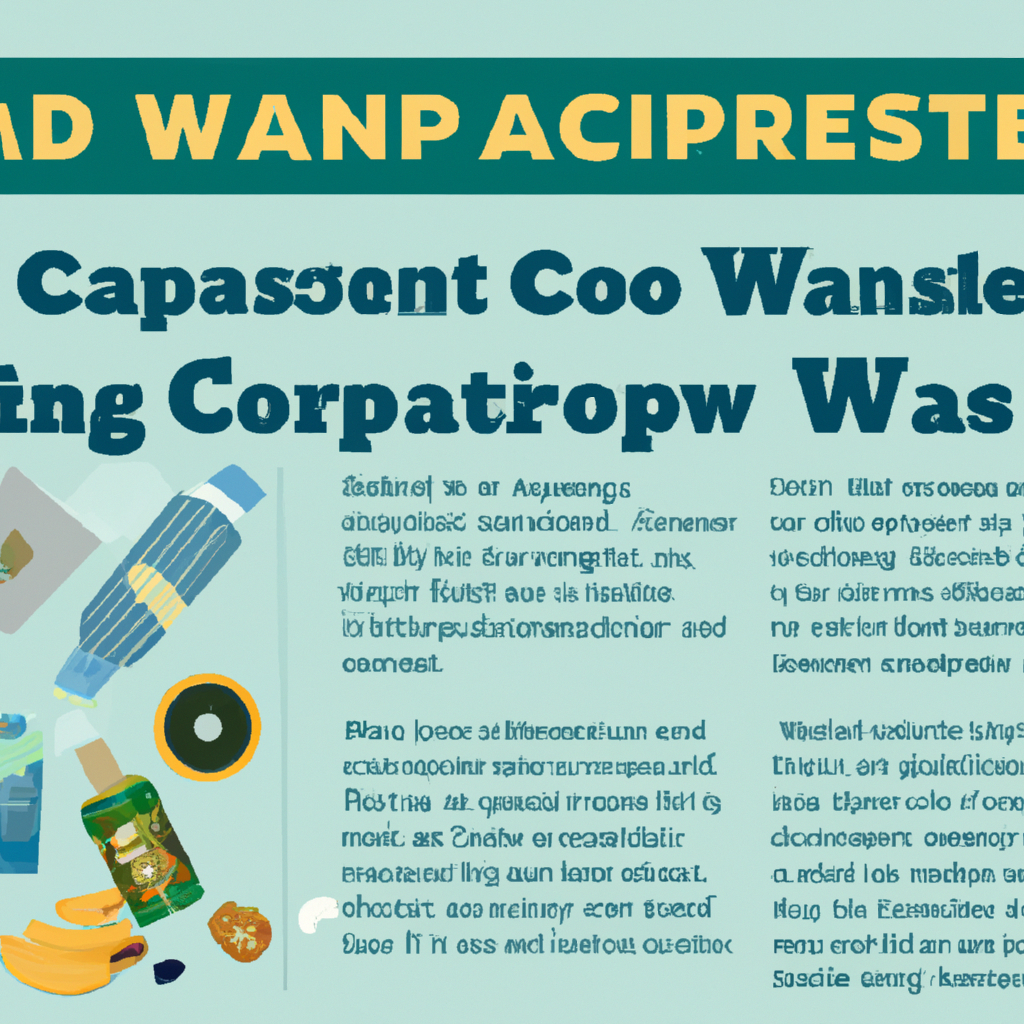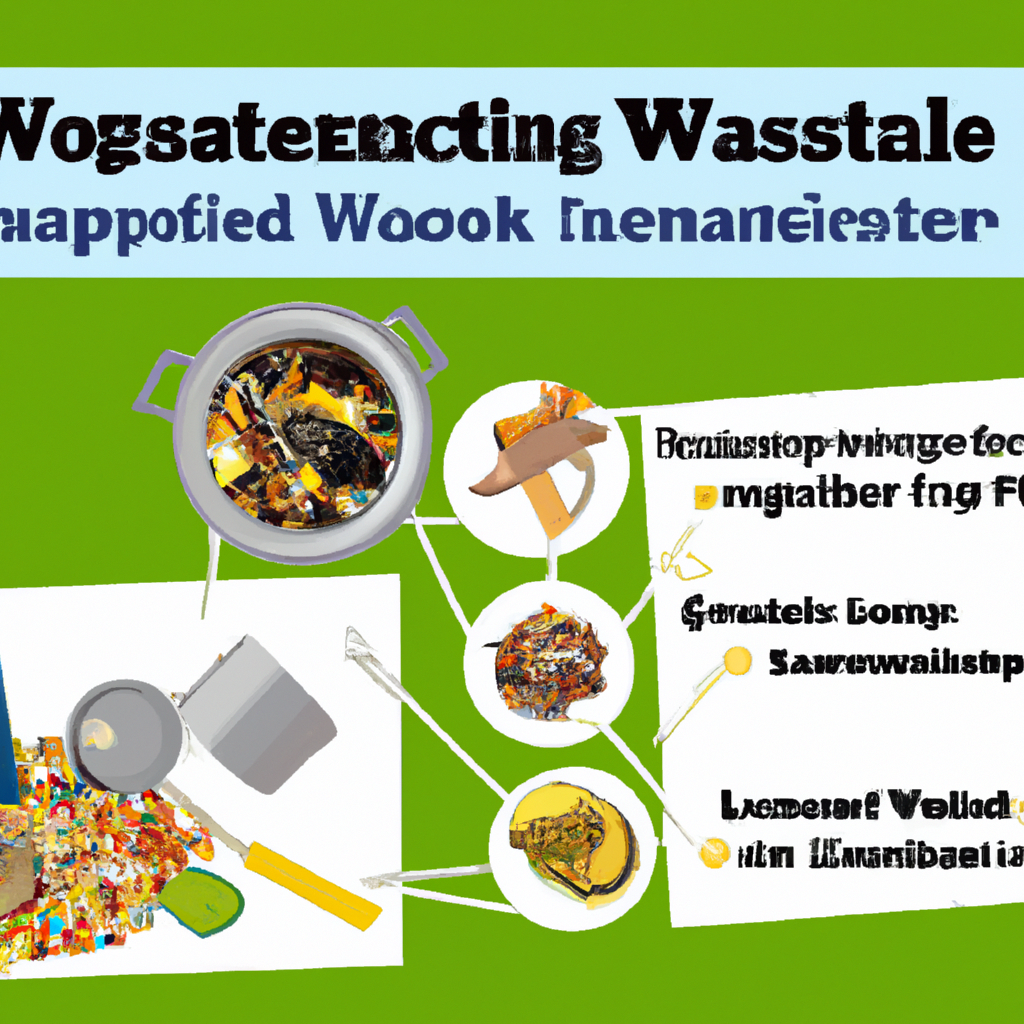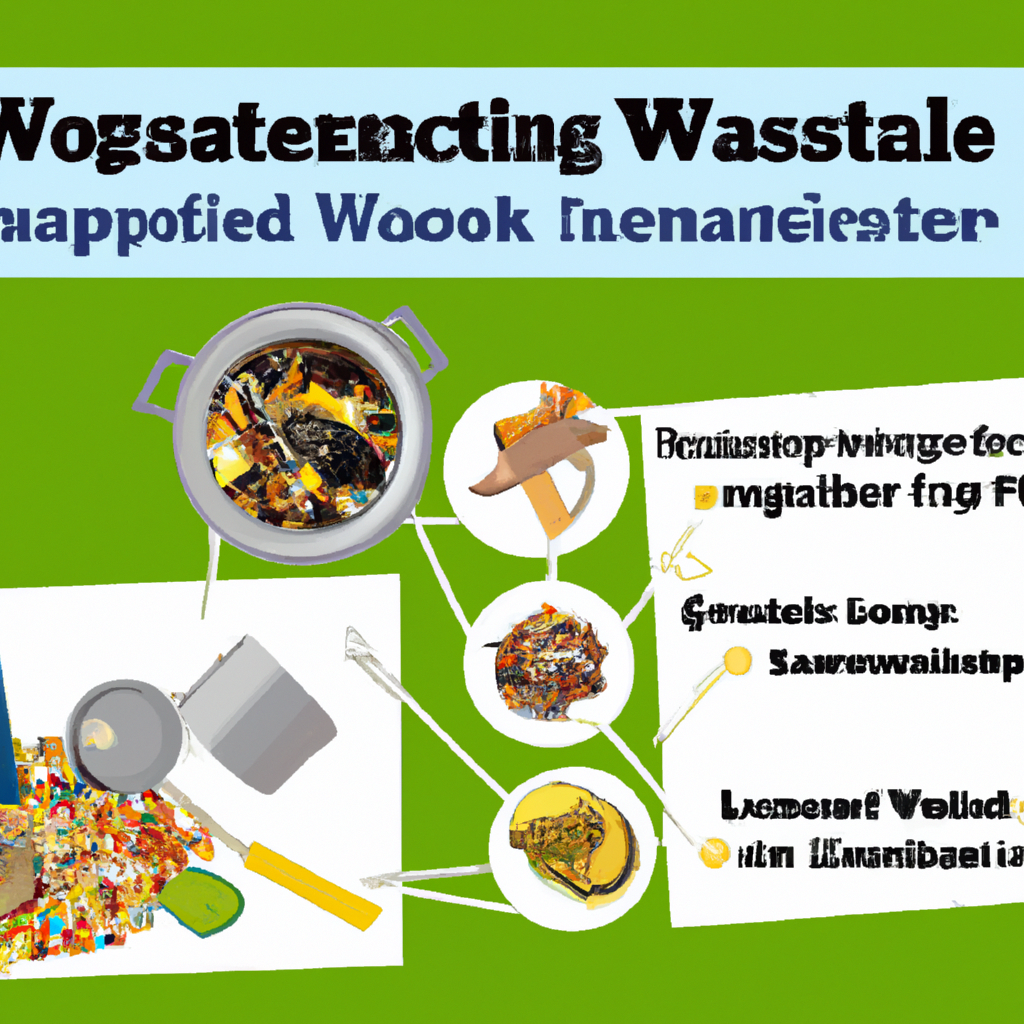Going on a camping trip is a thrilling adventure, but when it comes to managing food waste and trash, it can pose a challenge. From leftover scraps to packaging materials, figuring out the best ways to handle these can leave you scratching your head. However, fear not! In this article, we’ll explore some practical tips and tricks to help you effectively handle food waste and trash while camping, ensuring a clean and eco-friendly experience amidst the great outdoors. So, let’s dive in and discover some simple yet effective solutions to make your camping trip hassle-free when it comes to waste management.

Preparation before Camping
Plan Your Meals
Before heading out on your camping adventure, it’s important to plan your meals. This will help minimize food waste and ensure that you pack exactly what you need. Consider the duration of your trip and the number of people in your group when planning your meals. Take into account any dietary restrictions or preferences to ensure that everyone will have enough to eat.
Pack Reusable Containers
Investing in reusable containers is not only environmentally friendly, but it also helps minimize waste while camping. Pack your meals in these containers to keep them fresh and prevent any spills or leaks. Reusable containers are also great for storing leftovers and reducing the need for single-use plastic or aluminum foil.
Bring Trash Bags
When preparing for your camping trip, don’t forget to pack plenty of trash bags. These will come in handy for collecting and disposing of any waste generated during your time outdoors. Make sure to choose sturdy, leak-proof bags that are large enough to hold all of your trash.
Consider Composting
Composting is a great way to reduce food waste and nourish the environment. Before you leave for your camping trip, consider setting up a small compost bin at your campsite. This will allow you to separate organic waste from other trash and turn it into nutrient-rich compost. Composting can be a fun and responsible way to manage food waste while camping.
Minimizing Food Waste
Only Bring What You Need
To minimize food waste while camping, it’s crucial to bring only what you need. Plan your meals and snacks carefully to avoid overpacking. Consider portion sizes and pack food items that have a longer shelf life. By bringing only what you need, you’ll not only reduce waste but also lighten your load for a more enjoyable camping experience.
Opt for Durable Food Items
When selecting food items to bring camping, opt for those that are durable and have a long shelf life. Choose fruits and vegetables that won’t spoil quickly, such as apples, carrots, and potatoes. Pack canned goods instead of perishable items whenever possible. This will help minimize the risk of food waste and prevent any spoilage during your trip.
Store Food Properly
Properly storing food is essential to prevent waste and keep it fresh. Make sure to store perishable items, such as meat and dairy products, in a well-insulated cooler with plenty of ice or ice packs. Keep the cooler in a shaded area to maintain a lower temperature. Non-perishable items can be stored in sealed containers to protect them from pests and moisture.
Label and Rotate Food
Labeling and rotating your food items can help ensure that nothing goes to waste. Clearly label each container with its contents and the date it was packed. This will help you keep track of what needs to be eaten first and avoid any expired or spoiled food. By rotating your food supply, you’ll have a better chance of using everything before it goes bad.
Reuse Leftovers
Leftovers from one meal can be transformed into a delicious meal the next day. Instead of throwing away any uneaten food, get creative and repurpose it. Leftover grilled vegetables can be added to a salad, and excess cooked meat can be turned into sandwiches. Reusing leftovers not only reduces waste but also saves you time and effort in cooking additional meals.
Proper Food Disposal
Empty Solid Waste in Designated Bins
When it comes to disposing of solid waste, it’s essential to do so in designated bins. Many campgrounds have designated trash collection areas where you can safely dispose of solid waste. Make sure to separate your trash from recyclables, and follow any specific rules or regulations set by the campground.
Dispose of Liquid Waste Responsibly
Liquid waste should never be dumped directly onto the ground or into natural water sources. Instead, dispose of liquid waste responsibly. If the campground provides a designated area for gray water disposal, use it. Otherwise, scatter the water at least 200 feet away from any water sources, campsites, or trails to minimize the impact on the environment.
Pack Out Non-Burnable Trash
Not all trash is suitable for burning, especially plastics and other non-burnable items. These should be packed out and disposed of properly in designated trash receptacles. Remember, leaving burnable or non-burnable trash behind can harm the environment and disrupt the ecosystem of the campsite.
Follow Campground Regulations
Each campground may have its own set of regulations regarding food and waste disposal. It is crucial to familiarize yourself with these rules before your trip. Follow the campground regulations to ensure that you are disposing of your food waste and trash in the most responsible and environmentally-friendly manner possible.

Dealing with Water Waste
Use Biodegradable Soap
When washing dishes or yourself at the campsite, use biodegradable soap. Biodegradable soap breaks down naturally, minimizing its impact on the environment. Avoid using regular dish soap, as it can contain chemicals that are harmful to plants, animals, and water sources.
Dispose of Gray Water Safely
Gray water, which is water used for cleaning, should never be dumped directly into natural water sources. Instead, dispose of gray water safely. If your campground provides a designated area for gray water disposal, use it. Otherwise, disperse the water at least 200 feet away from any water sources or campsites, and ensure that it is absorbed into the soil.
Avoid Contaminating Water Sources
When camping, it is crucial to avoid contaminating any water sources around you. Never dump waste, including food scraps or trash, into rivers, lakes, or streams. These bodies of water are home to various plants and animals, and contaminating them can have a detrimental effect on the ecosystem. Always dispose of waste properly and respect the natural water sources.
Composting
Set Up a Compost Bin
If you are committed to reducing your environmental footprint, consider setting up a compost bin at your campsite. Choose a designated area away from your sleeping and cooking areas to prevent any unwanted smells or pests. Use a compost bin or container to collect organic waste, such as fruit and vegetable peels, coffee grounds, and eggshells.
Separate Organic Waste
To create nutrient-rich compost, it’s important to separate organic waste from other trash. Use a separate container or bag specifically for collecting food scraps and other organic materials. By keeping organic waste separate, you can easily manage and turn it into compost later on.
Balance the Compost
A well-balanced compost pile requires a mixture of green and brown materials. Green materials include food scraps and grass clippings, while brown materials include leaves, twigs, and paper. Aim for a 2:1 ratio of brown to green materials to ensure proper decomposition and the right balance of nutrients in your compost.
Cover and Maintain the Compost
To prevent odors and pests, cover your compost pile with a tarp or lid. This will also help regulate the moisture levels within the compost. Remember to turn the compost regularly to aerate it and speed up the decomposition process. Keep the compost moist but not overly wet, as excessive moisture can lead to a foul smell and slow down decomposition.
Utilize Compost at Campsite
Once your compost has fully decomposed, it can be utilized at your campsite. Spread the nutrient-rich compost around trees, plants, or flowers to help them grow. Not only will this reduce waste, but it will also contribute to the overall health and vitality of the ecosystem in your campsite.
Managing Trash
Pack Out Your Trash
One of the most important principles of sustainable camping is to pack out your trash. This means bringing back all of your waste with you when you leave the campsite. Make sure to pack sturdy trash bags that won’t leak or tear easily, and ensure that all trash is securely sealed.
Identify Local Trash Disposal Options
Before setting off on your camping trip, research the local trash disposal options in the area. Find out where the closest recycling centers and landfill facilities are located. By identifying these options beforehand, you can make sure that your waste is disposed of properly and in an environmentally-friendly manner.
Recycle Whenever Possible
Recycling is an essential part of responsible waste management. While camping, make an effort to recycle as much as possible. Separate recyclable items, such as aluminum cans, glass bottles, and plastic containers, from the rest of your trash. If your campground doesn’t provide recycling facilities, take these items with you and recycle them at the nearest recycling center.
Avoid Burning Trash
Burning trash may seem like an easy way to get rid of it, but it isn’t always the best option. Burning certain materials, such as plastics, can release harmful toxins into the air. Additionally, burning trash can harm the natural environment and leave behind unsightly debris. Instead, prioritize proper waste disposal methods, such as packing out your trash or recycling.
Wildlife Interactions
Keep Your Campsite Clean
Keeping your campsite clean is essential for minimizing wildlife interactions. Animals are attracted to the smell of food, so make sure to clean up any spills or food scraps immediately. Store food and trash securely to prevent animals from rummaging through your campsite and potentially causing harm to themselves or your belongings.
Store Food Securely
To avoid attracting wildlife, store your food securely in bear-resistant containers or lockable coolers. These containers are designed to keep animals out and prevent them from accessing your food. Hang food bags or coolers from a tree branch, at least 10 feet off the ground and 4 feet away from the trunk, to further deter wildlife.
Use Bear-Resistant Containers
If you are camping in an area with a high bear population, it is crucial to use bear-resistant containers for storing your food. These containers are specifically designed to withstand the strength and persistence of bears. Follow the manufacturer’s instructions to properly secure your food and prevent any unwanted bear encounters.
Avoid Feeding Wildlife
While it may be tempting to feed wildlife, it is important to resist the urge. Feeding wildlife can disrupt their natural behaviors and lead to dependency on human food. It can also alter their diet and potentially harm their health. Enjoy observing wildlife from a distance, but keep your interactions limited to ensure the well-being of both the animals and yourself.
Educating Fellow Campers
Lead by Example
One of the most effective ways to educate fellow campers about responsible waste management is by leading by example. Practice all of the principles mentioned in this article and demonstrate responsible behavior. Show others how to properly dispose of waste, separate recyclables, and store food securely. Your actions can inspire and motivate others to follow suit.
Share Tips and Information
Spread awareness about responsible waste management by sharing tips and information with your fellow campers. Start a conversation with your neighbors or fellow campers and share your knowledge about composting or recycling. Offer practical tips and suggestions for reducing waste while camping. By educating others, you can create a more sustainable camping community.
Organize Clean-Up Events
Consider organizing clean-up events during your camping trips. Invite fellow campers to participate in group efforts to clean up the campground and surrounding areas. Provide trash bags and gloves, and designate specific areas that need attention. Not only will this help keep the environment clean, but it will also bring campers together for a common cause.
Leave No Trace Principles
Plan Ahead and Prepare
Before embarking on your camping trip, take the time to plan ahead and prepare. Research the campground’s rules and regulations, familiarize yourself with local waste management options, and educate yourself on the area’s flora and fauna. By planning ahead, you can minimize your impact on the environment and ensure a more enjoyable camping experience.
Travel and Camp on Durable Surfaces
When setting up your campsite, choose a durable surface for your tents and other camping equipment. Avoid camping on fragile vegetation or near water sources. Use established campsites whenever possible to minimize your impact on untouched areas. Travel on designated trails to avoid damaging delicate ecosystems and vegetation.
Dispose of Waste Properly
Proper waste disposal is crucial to leaving no trace while camping. Pack out all of your trash, dispose of solid waste in designated bins, and follow campground regulations regarding gray water disposal. Leave the campsite as you found it, free from any waste or debris. By disposing of waste properly, you can ensure that future campers can enjoy the same pristine environment.
Leave What You Find
When exploring nature during your camping trip, leave everything as you found it. Resist the urge to collect rocks, plants, or other natural items as souvenirs. Removing these items can disrupt the ecosystem and harm the natural balance of the environment. Respect the natural beauty and leave it intact for others to enjoy.
Minimize Campfire Impact
Campfires are a common activity while camping, but it’s important to minimize their impact. Use established fire rings or fire pits whenever available. If permitted by the campground, collect only dead and downed wood for your fire. Avoid cutting or damaging live trees and vegetation. Make sure to fully extinguish the fire before leaving the campsite.
Respect Wildlife
Respecting wildlife is essential for their well-being and the overall health of the ecosystem. Observe animals from a distance and do not approach or disturb them. Refrain from feeding wildlife, as this can disrupt their natural behaviors and potentially harm their health. Keep your campsite clean and store food securely to prevent wildlife from becoming attracted to your site.
Be Considerate of Other Visitors
When camping, it’s important to be considerate of other visitors and their experience. Keep noise levels down, especially during quiet hours, to ensure a peaceful atmosphere for everyone. Follow campground rules and etiquette, including respecting boundaries and being mindful of shared spaces. By being considerate, you can help create a positive and enjoyable environment for all campers.
Conclusion
By following these tips and principles, you can handle food waste and trash responsibly while camping. From planning your meals and packing reusable containers to educating fellow campers and leaving no trace, every action you take can make a positive impact on the environment. Remember that minimizing waste and respecting nature are key to preserving the beauty and tranquility of our natural surroundings for future generations to enjoy. Happy camping!

